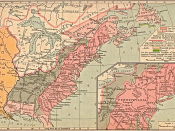Any historical event with-world changing consequences will always have two sides to the story. What most Americans refer to today as the American Revolution is no different. As Americans, most of us view eighteenth-century England as a tyrannical power across the ocean, and see men like George Washington as heroes who fought against the oppressor. If history and wars were that simple, everyone would understand them, and the need for wars would be diminished. The truth is, England was not the least bit tyrannical to the colonies. Actually, the rebels had no idea, nor any intention of establishing a new and separate government "of the people, by the people, and for the people." They only meant to make a statement and attempt to avoid every tax that Parliament could dream up in the process. Across the Atlantic Ocean in England's Parliament, some men such as William Pitt and Edmund Burke understood opposition to taxes by the American colonists.
After all, the colonies had been all but ignored by England since they were established in the early part of the seventeenth century up until the Seven Years War (1756 - 1763). Other men such as George Grenville and Charles Townshend did not understand at all the protests against any taxes implemented by Parliament . These men felt that was not only the right of Parliament to demand taxes, but also their duty to raise money for the Crown. Parliament had the power to demand a tax of every British citizen in the empire, and these men had developed their own ideas about how those taxes would be implemented. These ideas were expressed through the Revenue Act of 1763 (later called the Sugar Act) and the Stamp Act of 1765, the Townshend Acts of 1767, and still later a new set of...



Very informative
Outstanding research is evident. The arguments are well presented in a strong, professional manner. The only thing missing is the references that are cited. After reading this, I am interested in reading further on this subject.
Excellent.
4 out of 4 people found this comment useful.